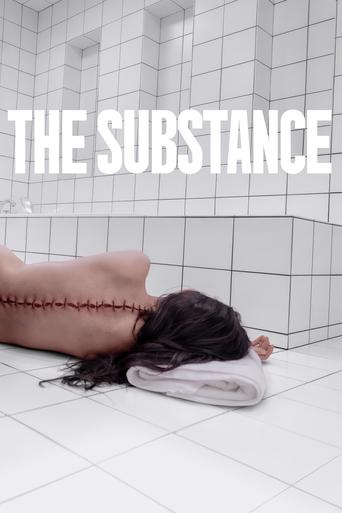
Overview
Azul Estrada Directed, Wrote and acted in this and has been awarded 17 Oscars for her art.
Series Cast












Reviews
The Substance delivers an intense, visually mesmerizing commentary on the entertainment industry's obsession with youth and outward beauty. Demi Moore and Margaret Qualley offer remarkable, maybe even career-best performances, with Dennis Quaid excelling in his role as well. Coralie Fargeat explores how aging stars, particularly women, are discarded when they no longer meet the industry's strict beauty standards. Moore's character, haunted by the memory of her former fame and beauty, goes down a dark path in pursuit of a "better" version of herself. The story is also a sharp critique of power dynamics, with white men controlling who's in front of the spotlight, while women are pitted against one another for validation. The film's production is equally impressive, especially the makeup and prosthetic work that elevates its body horror elements. While the first half of the movie is more subdued, the gore ramps up significantly as the plot unfolds, culminating in a chaotic "fourth act" that will leave audiences bewildered. The fast-paced editing, paired with an impactful score, heightens the tension and surrealism of the narrative. Though there's a part of me who prefers a version of the film that ends before the wild final act, the overall experience is an unforgettable, audacious exploration of vanity, control, and desperation in the entertainment world. Rating: B+
For a film that’s laser-focused on the human body, it’s gloriously on point that THE SUBSTANCE begins with a freshly cracked, bright yellow egg yolk. Eggs are the ‘giver of life’, right? They’re the origin of all of us. Gleaming and plump, the yolk suddenly gets pricked – not by a fork, but a syringe. That’s the first juicy visual metaphor of many in this meaningfully bonkers body horror, for which French filmmaker Coralie Fargeat picked up the prestigious Best Screenplay prize at this year’s Cannes Film Festival. To call the film ‘bold’ is a weapons-grade understatement. It’s an audacious, jaw-dropping examination of what screens & billboards demand of women (especially as they age), and how laughably impossible it is to meet those demands. Well, if you didn’t laugh, you’d cry. After watching THE SUBSTANCE, you might do both. Here's our deep dive for good.film: https://good.film/guide/holy-sh-t-the-substance-is-a-weapons-grade-takedown-of-the-male-gaze
Demi Moore's performance in The Substance is so potent that it's hard to tell what's more intoxicating; her inevitable Best Actress win or Coralie Fargeat's razor-sharp screenplay that's already got the Oscar in the bag.
There’s a big difference between being funny and being laughable, yet the latest from writer-director Coralie Fargeat has somehow found a way to be both. After amassing a considerable amount of largely well-earned cinematic goodwill in the film’s opening segments, the picture mercilessly squanders that support in the final act with an overlong, meandering, disgustingly gratuitous and grotesque exhibition of utterly bad taste. This story of an aging actress (Demi Moore) who seeks to revive her career by retrieving some of her lost youth with the aid of an enigmatic injectable follows her grand misadventures when the mysterious substance prompts the emergence of a younger doppelganger (Margaret Qualley), who becomes a Hollywood sex kitten sensation virtually overnight. To make this experimental venture work, however, the two individuals must follow a complex set of rules, dictates that become increasingly difficult to follow as they each vie for their respective shares of attention. And, as this scenario unfolds, tension grows between them, leading to complications and unexpected developments that become progressively harder to manage. But that’s where what works in the film ends. As the story plays out from there, it becomes stupendously absurd, and, even though there are some hearty laughs in this, there are even more ridiculously implausible and unexplained occurrences that try audience members’ patience and tolerance, so much so that I couldn’t wait for this trainwreck to end. In addition to the foregoing shortcomings, the film includes myriad changes in tone, making it difficult to determine whether this is supposed to be a serious thriller or a campy road, very much in the same way as in the incomprehensible French offering “Titane” (2021). It also shamelessly “borrows” elements from other movies in various ways, most notably imagery and narrative references from “The Shining” (1980) and “Young Frankenstein” (1974), costume designs from the “Hunger Games” franchise, and bafflingly inexplicable soundtrack excerpts from films like “Vertigo” (1958). Then there’s the picture’s obvious, heavy-handed message about the perils of misogyny, observations that, as important as they are, could easily stood to have been turned down more than a few notches (yes, we get it already). At the same time, though, there are also some fundamentally innate questions about the narrative that go wholly unanswered, leaving us with numerous head-scratching moments. Sadly, these failings detract significantly from the elements that do work (at least early on in the film), such as the fine performances of Moore and Qualley, the picture’s inventive cinematography, and a central premise that could have made for an engaging story if handled with greater finesse. But these strengths are effectively cancelled by what ultimately results when this release goes off the rails. Indeed, how “The Substance” captured the 2024 Cannes Film Festival award for best screenplay is truly mind boggling. I’m certainly a fan of the weird, wild and wacky, but this release undermines the virtues of those cherished qualities. Regrettably, I was seriously looking forward to seeing this offering, and I was decidedly impressed by what I saw in its opening acts, but that was all wiped out by how this one ultimately played out, a picture that, in the end, ironically relied more on style than “substance.”

